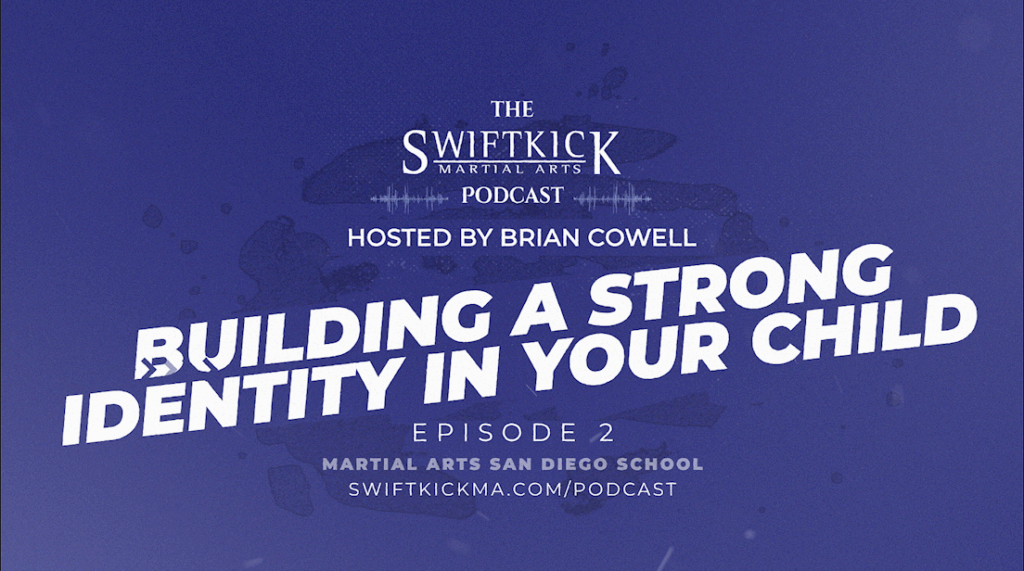Click to listen on any platform!
In today’s fast-paced, screen-driven world, more parents are seeking ways to help their children develop emotional strength, self-discipline, and meaningful social skills. In a recent episode of the SwiftKick Podcast, Brian Cowell, founder of SwiftKick Martial Arts, sat down with longtime student and coach Chandler Smith to explore how martial arts goes beyond punches and kicks to cultivate a powerful life philosophy.
The Journey from Batman to Black Belt
Coach Chandler shares how his childhood love for black-and-white samurai films and superheroes like Batman inspired his early passion for martial arts. But over the years, his understanding of martial arts deepened from a pursuit of flashy moves to a way of life grounded in discipline, mental sharpness, and emotional resilience. “Hitting the bag is great therapy,” Chandler says, emphasizing the mental clarity and emotional strength he found through consistent training.
After taking a brief break from martial arts, Chandler realized how much he missed the focus, creativity, and energy that came from training. That rediscovery fueled his passion to coach others and pass on life-changing lessons to the next generation.
Why Emotional Resilience Matters Today
Brian and Chandler dive into a concern many parents share today: children are growing up in a digital world where communication skills, confidence, and boundary-setting are often underdeveloped. Citing both personal experience and research, they emphasize how martial arts can help fill that gap.
Emotional resilience, as defined by Brian, is the ability to maintain your sense of self, navigate challenges, and stand firm with confidence and joy. It requires a foundation built on two key pillars: mastering a competence skill and being socially connected with people who care. Martial arts, they argue, delivers both.
More Than Just a Sport: A Framework for Life
At SwiftKick, martial arts isn’t just about technique; it’s about developing life skills through intentional instruction. The curriculum is centered around three core values: Discipline, Honor, and Courage, each broken into practical, teachable tenets.
Discipline involves attentiveness and self-control. Instructors use age-appropriate exercises to help students focus, from sitting still for a few seconds to practicing restraint in high-energy situations. As Chandler notes, discipline starts small: “For my four-year-old, it’s sitting still for two seconds. That becomes five seconds. Then five minutes.”
Honor includes courtesy, respect, empathy, and humility. Through simple actions like saying “please” and recognizing the perspectives of others, students learn to value people, even in disagreement. The practice of humility is particularly powerful in sparring, where acknowledging another’s skill becomes a character-building moment.
Courage is woven throughout the conversation as students learn to face fear, overcome adversity, and grow through challenge.
Stress Inoculation: Training for Real Life
A key concept discussed is “progressive stress inoculation” — the idea of gradually exposing students to controlled stress so they build resilience over time. From playful sparring with foam noodles to more intense drills, kids learn to manage fear, ego, and emotional reactivity.
This training is especially transformative for two types of kids: the shy, under confident ones, and the impulsive, aggressive ones. Martial arts helps both find balance. Shy kids gain assertiveness; reactive kids learn self-regulation.
The Role of Parents and Coaches
Martial arts works best when instructors and parents collaborate. Brian and Chandler highlight how essential it is for parents to reinforce the same values at home. While the dojo provides structured lessons, lasting growth happens through everyday practice. Coaches often partner with parents to address challenges at home, offering strategies that align with classroom principles.
This partnership also provides what psychologists call “third-party validation”—a non-parental voice reinforcing the lessons parents are teaching. It’s especially critical in the developmental years when kids are forming habits and identity.
Beyond the Mat: Lifelong Impact
Martial arts builds transferable skills that extend into school, work, and relationships. Discipline, empathy, humility, and confidence aren’t just useful for earning belts—they’re vital for life success. As Brian puts it, “This is why martial arts is a lifestyle. Going for black belt isn’t just a goal; it’s a time-tested journey of growth.”
Brian adds that many business leaders prioritize soft skills like teamwork, reliability, and emotional intelligence over technical expertise. Martial arts training, especially at a school like SwiftKick, helps develop those exact traits.
Final Thoughts: One Class at a Time
The episode closes with a reminder that real growth is gradual. It doesn’t happen overnight, but rather “one class at a time, one moment at a time.” Whether you’re a parent looking for support, a child seeking confidence, or an adult needing a reset, martial arts offers a path toward personal transformation.
To learn more or try a free class, visit SwiftKick Martial Arts at their Rancho Bernardo or Carlsbad locations. It could be the first step toward building a rock-solid foundation for your child’s future—or your own.
Interested in martial arts classes in San Diego? Visit SwiftKick Martial Arts to schedule your free trial today!

